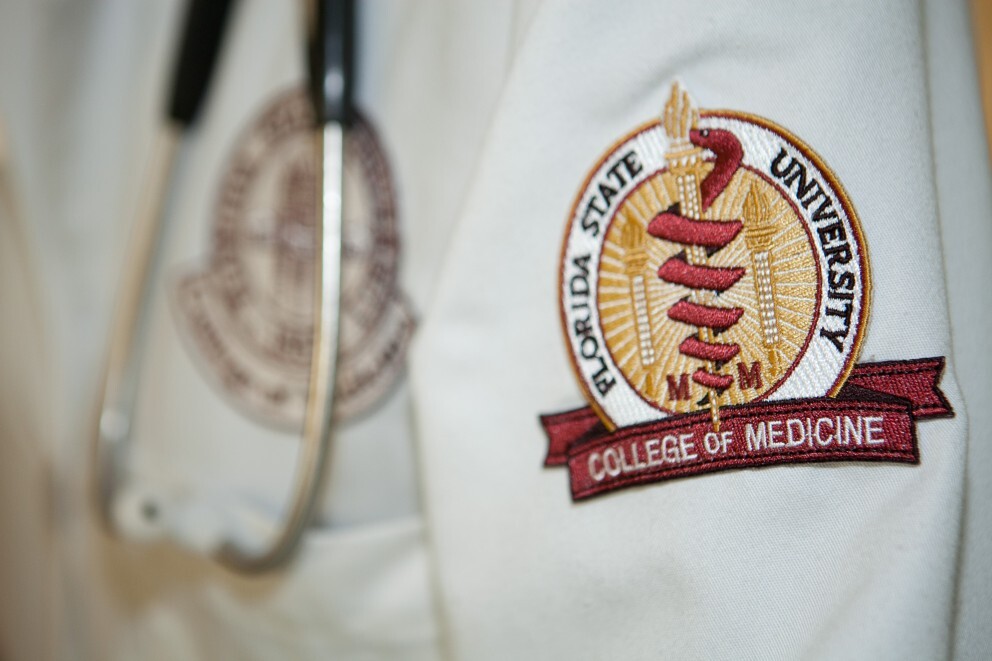It was exciting news for Vero Beach when the Indian River County Hospital District executed a 20-year lease to own agreement with Edward Via College of Osteopathic Medicine in September.
The agreement stipulates that the college will open a four-year medical school by Oct. 1, 2027, bringing needed doctor training to the Treasure Coast.
What many area residents don’t realize is that there’s already a thriving medical school on the Treasure Coast at the Fort Pierce Regional Campus of Florida State University College of Medicine, which has graduated 1,953 M.D.s since it opened in 2007.
On Oct. 18, Dr. Alma Littles, dean of Florida State University College of Medicine, traveled from Tallahassee to the Fort Pierce college for the 2024 Faculty Appreciation Dinner. Local faculty members celebrated with students as awards were presented to selected faculty and scholarships were given to graduating fourth year students. Physician assistant students graduating in December also received gifts.
“I just want to thank the faculty who are the teachers and mentor of our students at this campus,” Dr. Littles said. “You are the ones that really make it happen and we thank you for allowing our students to come into your offices and into your medical centers and hospitals, sharing in the care of patients as they themselves learn to be competent and compassionate clinicians, physicians and physician assistants. Each of our clerkship programs rank in the 90th percentile or above in quality, compared to responses from graduates across the country.”
The state college was designed as a community based medical school. Students spend their first two years taking basic science courses on the FSU campus in Tallahassee and are then assigned to one of the regional medical school campuses for their third- and fourth-year clinical training.
Regional campuses are located in Fort Pierce, Daytona Beach, Orlando, Pensacola, Sarasota and Tallahassee.
“As of today, the FSU College of Medicine has 1,953 M.D. alumni; 1078 of them have completed their residencies and fellowships and we still have half of them in training,” Dr. Littles said.
“Fifty-three percent of those who are out of residency are practicing in Florida with 50 percent of them in primary care.
“According to the U.S. News and World Report, we rank No. 1 in the state for having the most graduates who practice in health professional shortage areas. We’re No. 17 among all public and private institutions rated in that category in the country. This ranking is particularly important to us, as it speaks directly to our mission of preparing physicians who will deliver high-quality, patent care in communities of greatest need.
“We currently have 255 physician assistant graduates and there are more than 250 residents who have taken part in our 14 Graduate Medical Education programs across the state. We are doing our best to address the shortage of healthcare and clinicians in the state of Florida and beyond.”
Graduate medical education refers to the residency programs all medical students join after medical school to accomplish three- to four-year apprenticeships in their chosen specialty. For example, someone who plans a career in internal medicine, whether they are an M.D. or a D.O. student, will take a three-year residency in internal medicine. Obstetrics and gynecology is a four-year residency. FSU created some of its own programs enabling graduating students to remain within the FSU community to train.
The Fort Pierce Regional Campus of the FSUCOM has hosted third- and fourth-year medical students to complete their clinical rotations across the Treasure Coast since 2007. Each year an average of 20 M.D. third-year students, 20 fourth-year students and 10 physician assistant students are enrolled on the Fort Pierce campus.
During the clinical phase of their education, students go out into the community and learn directly from hundreds of healthcare professionals. The Fort Pierce Regional Campus has over 300 physicians, physician assistants and nurse practitioners on its faculty to teach students the art and science of medicine. These one-on-one apprenticeships take place in local doctors’ offices and affiliated hospitals.
Clerkship directors from the Treasure Coast direct students’ rotations in family medicine, internal medicine, pediatrics, surgery, obstetrics-gynecology, psychiatry, geriatrics, emergency medicine and now osteopathic medicine. Community physicians serve as clerkship faculty.
After completing their rotations, students are prepared to make a smooth transition into medical residency training or employment as physician assistants.
“Our students rotate through every hospital system on the Treasure Coast including the Cleveland Clinic Indian River, Martin North, South and Tradition,” said Dr. Juliette Lomax-Homier, Fort Pierce Regional Campus dean. “HCA Lawnwood Regional Medical Center and Port St. Lucie Medical Center host our students as well, as does the current Sebastian Hospital.
“Many of our students were raised on the Treasure Coast and are able to come back home to complete their third and fourth year of medical school. This is a tremendous savings for them as they don’t have to pay for housing. Our goal is to train them here and hopefully have them return to our community as practicing physicians.”
The mission of Florida State University College of Medicine is “to educate and develop exemplary physicians and physician assistants who practice patient-centered healthcare, discover and advance knowledge and are responsive to community needs, especially through service to elder, rural, minority and underserved populations.”
The FSU College of Medicine-Fort Pierce Regional Campus is located on the main campus of Indian River State College in Fort Pierce.

